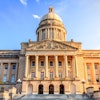Attacks on gender and sexuality in the American school system need not be direct. According to a new report from PEN America, they are often insidious and harmful all the same. James Tager
James Tager
The report illustrates the frequency and volume with which legislative action goes beyond just overt content bans, instead creating “chilled climates” that deter the teaching of such content in schools.
These “educational intimidation bills” (EIBs) function not through blatant censorship but through fear, supervision, pressure, and the supporting of opposition, all of which lead to self-censorship, the authors of the report wrote.
“Put simply, these ‘educational intimidation’ provisions, as we dub them, empower the use of intimidation tactics to cast a broad chilling effect over K–12 classrooms by mandating new and intrusive forms of inspection or monitoring of schools, as well as new ways for members of the public—including, in some cases, citizens with no direct connection to the schools—to object to whatever they see that they do not like,” the authors wrote.
The report – together with the organization’s Index of EIBs – lists the state-level educational intimidation bills in the past three years. 392 were introduced between January 2021 and June 2023, and 39 have been passed into law since. And while these policies have a less than 10% pass rate, they can be reintroduced or recycled for future legislative sessions, the report authors wrote.
At least 19 U.S. states have educational intimidation tactics in place, and many local districts are also experimenting with similar sentiments, according to the report.
“All but 15 of the 392 bills introduced since January 2021 were sponsored exclusively by Republicans, and both Florida Governor Ron DeSantis and former President Donald Trump have touted these educational policies on the presidential campaign trail,” the report’s authors wrote.
EIBs come in various forms and many share similar strategies. The report categorizes 12 common provisions, including burdensome content inspection requirements; broad and vague opt-out policies; expansions of what counts as 'harmful to minors'; and monitoring and surveillance access.
What these EIBs do is set the stage for systems where people – whether it be teachers, librarians, supervisors, or school leaders – are incentivized to err on the side of caution so as not to include potentially controversial topics or content, said James Tager, research director for PEN America.
“We have to think about the fact that it's not just the individual teachers who are sort of the targets of these bills. Because an individual teacher or librarian may feel brave enough to put, at times, their job on the line,” Tager said. “But often it can be the higher-ups who feel incentivized to follow the notes of caution that these laws impose on an entire school.
“It incentivizes school districts and schools at large to basically streamline the process so that anything remotely controversial, anything that can be objected to, anything that an ideologically driven member of the community or individual parent may object to, they just kind of remove that from the curriculum or library."
And gauging just how pervasively EIBs are silencing educators can be difficult, given that many of these instances will be “invisible” and never reported on, Tager said.
Florida’s ‘Don’t Say Gay’ Act
One prominent example of an EIB is DeSantis’s 2022 Parental Rights in Education Act – commonly called the Don’t Say Gay law – which espouses parental rights but has privacy and safety risks for LGBTQ+ students.
PEN America’s report explains how the bill legally obligates teachers to notify parents of their child’s well-being and health. Though seemingly well-meaning and innocuous, the bill requires educators to let parents know if there is a suspicion that their children might be LGBTQ+, even if the student may not want to disclose that information, the authors wrote.
It’s also just simpler to play it safe, as demonstrated by how the governor-turned-presidential candidate’s bill has led at least one school district to remove ‘Safe Space’ stickers for LGBTQ+ friendly campus locations. Pasco County did so, not because of opposition to safe spaces, but because of the ambiguity that comes with discerning why a student would be there in the first place, according to the report.
A student being there could possibly warrant a parental notification. So instead, the stickers were removed “to avoid misinterpretation and a potential violation of the law,” according to the report.
“For the states passing these bills, the fear is the point,” Randi Weingarten, president of the American Federation of Teachers, said in an email statement. “Teachers are walking on eggshells because their freedom to teach, and kids’ freedom to learn, is under siege.”
Amid the current political environment across the nation, there must be more done to prepare and support future teachers and administrators, said Dr. Robert Teranishi, professor of social science and comparative education at UCLA.
“We also need to express support for teachers and principals when they communicate their commitment to create a safe and inclusive learning environment,” he said in an email statement.
Parental rights
Using arguments hinged on parents’ rights, make it an uphill battle for opponents of EIBs, said Dr. Nicholas D. Hartlep, the Robert Charles Billings Endowed Chair in Education at Berea College.
"They utilize parents' rights and concerns as cover for policies and laws that ultimately harm democracy and children, a lot of times,” said Hartlep, a father of three. “Parents love their children. And no matter what party you are, it's hard to dismiss parents.
“Society loves parents. And so, these policies and strategy are effective because they're using parents as a form of censorship. You see that with anti-trans bills and rhetoric."
Local policies and decades-old federal laws – including the 1974 Family Educational Rights and Privacy Act (FERPA) and the 1978 Protection of Pupil Rights Amendment – already exist to ensure parental input and curriculum transparency, the report stated.
EIBs instead extend the reach of some parents to govern more than just their own children, Tager said.
“No one here is saying that parents don't have a major role to play in their child's education,” Tager said. “But what we're seeing is the idea that some parents' rights get to trump the rights of other parents, that the more ideological a parent is, that these laws basically impose the preferences of a few parents over the preferences of the majority of parents, students, and teachers."
Such legislation and resulting censorship ultimately lead to watered-down education and poor preparation for today’s students, Tager stressed.
"We basically incentivize school districts, teachers, and librarians to present this sort of sanitized, inoffensive, milquetoast version of American history, of access to literature and specific books,” Tager said. “This ill-prepares kids to operate in the modern world. It ill-prepares them to interact with people from other backgrounds. It ill-prepares them to engage in robust civic debate.”





















